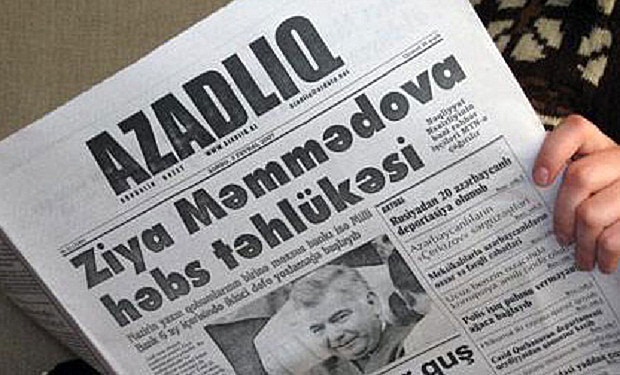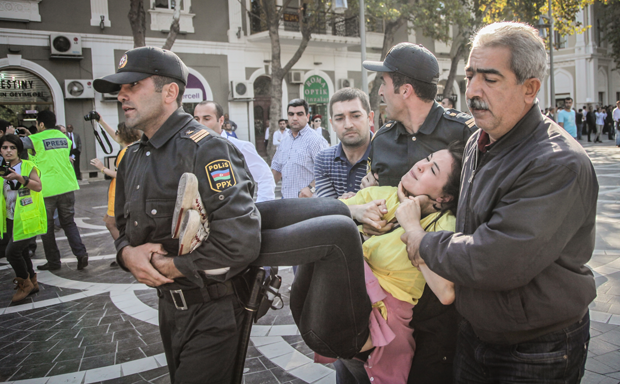Index relies entirely on the support of donors and readers to do its work.
Help us keep amplifying censored voices today.

Seymur Hezi, a reporter working for Azadliq, Azerbaijan’s last independent newspaper, was sentenced to a two month pretrial detention on Monday, charged with disorderly conduct. This morning, journalist Khadija Ismayilova was detained at the Baku airport, according to the Institute for Reporters’ Freedom and Safety (IRFS).
Hezi’s arrest is another sign of the continuing clampdown by Azerbaijan’s authoritarian government on civil society. The journalist was charged with an alleged attack on a person in the street, although his lawyers claim he was trying to protect himself after he had been harassed and attacked.
It is not the first time charges of hooliganism and disorderly conduct have been applied against opposition politicians, civil society activists and journalists in Azerbaijan. In previous years, the same charges were used to imprison critical journalists Sardar Alibeili and Ganimat Zahid as well as bloggers Emin Milli and Adnan Hajizadeh.
“Seymur Hezi’s arrest is a serious blow against our newspaper. He is one of the brightest Azerbaijani analysts and journalists, and a true intellectual,” Rahim Haciyev, acting editor of Azadliq newspaper, told Index.
Haciyev said he is sure Hezi’s arrest is the result of a planned provocation and the journalist is prosecuted for publishing critical articles on the authorities in the newspaper, as well as in his online TV program “Azerbaijani Hour”, which he scripts and hosts.
The journalist’s arrest came only a month after the newspaper he works for, Azadliq, was forced into suspension of publication due to financial pressure from the authorities. Now it exists only in its online version.
The authorities of Azerbaijan continue their clampdown on the civil society of the country. Well-know human rights defenders Rasul Jafarov, Intigam Aliyev, Leyla Yunus and her husband Arif Yunus are still behind bars after they were all sentenced to 3 months of pretrial detention. The office of the Institute for Reporters’ Freedom and Safety (IRFS) was searched and sealed.
This wave of repression is connected to new legislation in place in Azerbaijan that restricts the freedom of association. In fact the new law makes it illegal for unregistered civil society organisations to receive funds for their activities.
This article was posted on 5 Sept 2014 at indexoncensorship.org

Index Award winning Azadliq newspaper was forced into cancelling its print run last week with little hope of restoring its publication.
It is not that easy to get to the editorial office of Azadliq in Baku. Once you enter the building of Azerbaijan Publishing House, a police officer, who sits close to a statue of Heydar Aliyev, the late “father of the nation” and the actual father of the incumbent president Ilham Aliyev, asks you to call the office of the newspaper to get someone to pick you up downstairs. “Everyone in Baku knows their number,” an old lady in the phone room says as she tells me how to reach Azadliq.
Rahim Haciyev, an acting editor of the daily, smiles as he greets me, and leads to the top floor of the building that looks like a shattered remnant of the Soviet past. We pass a dark and neglected corridor that seems to be last painted around 1989 – the year Azadliq was launched.
The last day of July 2014 can become the end of what was the last independent daily in Azerbaijan as it was forced into suspension of publication.
“We owe 20,000 manat (about £15,000) to the publishing house, and they refuse to print our newspaper unless we pay the debt. But we are not able to, because we don’t get money for the newspaper sales. Gasid, the state-owned press distribution company, owes us 70,000 manat (about £53,000), which should be enough to cover our debts and operation costs. Its general manager is an MP and a member of the ruling party – and they just won’t pay us,” says Rahim Haciyev.
The authorities of Azerbaijan have used economic pressure to silence one of the last critical voices in the country. Last year the newspaper was a target of defamation suits that have resulted in £52,000 in fines, which were followed by bans against selling the paper at tube stations and on the streets of Baku. Thus, Azadliq lost sales of 3,500 copies daily – and with the official distribution network refusing to pay for the copies they sell, it has resulted in a complete blockade of any revenue streams. The State Press Support Fund refused to support the paper as well.
“The authorities have tried to stifle us for a long time, and it looks like they have finally succeeded. I don’t see them letting us go back to print. The only chance is strong pressure from the West, but I don’t expect this to happen. The Western democracies are now preoccupied with weakening the influence of Russia in the region, so it is unlikely they are going to put too much pressure on its neighbouring countries,” says Haciyev.
Azadliq’s editor also sees pressuring of the paper as a part of a wider campaign of the Azerbaijani authorities aimed at silencing of the country’s civil society. Two well-known human rights defenders, Leyla Yunus and Rasul Jafarov, were arrested last week; they will be detained pending trial for three months each.
“At the moment, when repressions against the civil society and human rights activists are getting tougher, the last thing they need is a critical newspaper that spreads the word about their clampdown. And we were the last daily that reported on those cases,” Haciyev points out.
Azadliq’s editorial team keeps working, although they have not been paid for two and a half months. The paper’s website, which is one of the most popular news source online in Azerbaijan, is still updated, but nobody knows for how long.
“Azadliq” means “freedom” is Azerbaijani. There is less and less freedom in the country that looks set to take a sad lead on the number of closed down media outlets and human rights activists in jail.
This article was posted on August 4, 2014 at indexoncensorship.org

One of the few remaining independent media outlets in Azerbaijan, the 2014 Index on Censorship Guardian Journalism Award-winning newspaper Azadliq has been forced to suspend publication due to an ongoing financial crisis. This comes just a day after the government of Azerbaijan targeted prominent human rights defenders Leyla and Arif Yunus and Rasul Jafarov. Yunus and her husband have been detained for three months as prosecutors build a case around charges that include high treason. Jafarov has been banned from traveling.
The paper’s Editor-in-Chief Rahim Haciyev told Contact AZ that without an immediate payment of 20,000 manat (£15,105.39) to its printer, the latest issue would not be produced. The paper’s government-backed distributor, which according to Haciyev owes Azadliq 70,000 manat (£52,868.86), has refused. This is not the first time that Azadliq, which has reported on government corruption and cronyism, has faced a financial cliff.
Index Reports: Locking up free expression: Azerbaijan silences critical voices (Oct 2013) | Running Scared: Azerbaijan’s silenced voices (Mar 2012)
This article was posted on July 31, 2014 at indexoncensorship.org
This week eight young Azerbaijani activists were sentenced to between six and eight years in jail. The members of the N!DA Youth Movement, which works for democracy and social change, were convicted for possession of drugs and explosives, and for intending to “cause public disorder”. The charges are widely believed to be trumped up, and the trials have been criticised by foreign observers over “irregularities” and “shortcomings”, including inconsistencies in testimonies and mishandling of evidence.
This is just the latest addition to a long list of human rights abuses by authorities in the oil rich country. As the repression has largely been allowed to take place away from international attention, this is a good moment to remember a few things about Azerbaijan, especially as the country prepares to take over a six month chairmanship of the Council of Europe’s Committee of Ministers.
According to the latest figures, there are 142 political prisoners in Azerbaijan today. These include human rights defenders, youth activists, and a large number of religious activists, among others. There are currently 17 people serving life sentences. Ahead of the country’s presidential election last October, candidate Ilgar Mammadov was arrested. In March, he was sentenced to seven years in prison for “organizing mass disturbances” and “resisting the police”. Meanwhile, President Ilham Aliyev insists that there are no political prisoners in Azerbaijan.

(Image: Aziz Karimov)
Attacks, threats and intimidation are regular occurrences for political opponents, activists and press in Azerbaijan. Following protests in the capital Baku as Aliyev secured his third consecutive term in power last October, demonstrators were beaten and detained by police. Police also raided the offices of independent Election Monitoring and Democracy Studies Centre (EMDSC) which reported irregularities in the election. In 2012, reporter Idrak Abbasov was brutally beaten when filming the demolition of a house by the State Oil Company of Azerbaijan, allegedly by employees of the company and police. The same year, fellow journalist Khadija Ismayilova, known for covering corruption among the country’s powerful elite, was blackmailed with intimate images of her and her boyfriend. She continues to face intimidation today. These abuses are often allowed to happen with impunity.
Azerbaijan’s critical press have long been subjected to an array of attacks. Independent news outlets face economic sanctions, and are often barred from distribution networks. Some 70% of distribution is controlled by the government. Most of the nine national TV channels are either directly owned by the state or controlled by the authorities. Journalists also fall victim to legal threats. In the first six months of 2013, 36 defamation suits were brought against media outlets or journalists, four of which were criminal defamation suits. One victim of this hugely restrictive media environment is leading independent paper and Index Award winner Azadliq. The paper has been hit with £52,000 worth of fines following defamation suits, state-owned press distribution company Gasid has not been transferring payments that reflect the paper’s sales. Azadliq claims Gasid owe them some £44,000.
While the situation inside the country shifts between bad and worse, authorities have focused their attentions on a wide-reaching international PR campaign. Ahead of hosting the Eurovision Song Contest, authorities ordered urban renewal that saw houses demolished and families evicted. Vast sums have in recent years been poured into the radical regeneration and beautification of Baku, and there’s more to come. There is also the posh London bar Baku, owned by the Aliyevs; the glossy, internationally distributed Baku magazine, edited by first daughter Leyla and co-published by Conde Nast; and the sponsorship deal with Champions League finalists Atlético Madrid. Next year, Baku will again play host to a prestigious international event — the inaugural European Games.
“The Committee of Ministers supervises the execution of judgments of the European Court of Human Rights the Council of Europe…The Committee of Ministers’ essential function is to ensure that member states comply with the judgments and certain decisions of the European Court of Human Rights,” the Council of Europe declare on their website. Next week Azerbaijan will assume the chairmanship of this very Committee of Ministers. But one could say that COE is only sticking to form in its relationship with the country. Only last year, a majority in its Parliamentary Assembly (PACE) voted down a resolution on the existence of political prisoners in Azerbaijan.
This article was originally published on 8 May 2014 at indexoncensorship.org